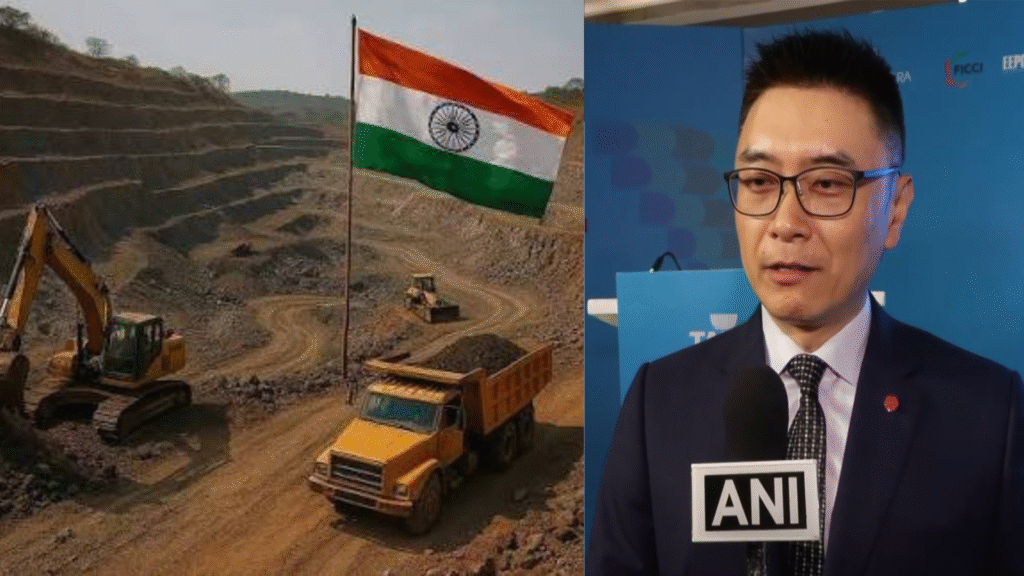
India-Taiwan Strategic Partnership: A New Chapter in Asian Geopolitics
A groundbreaking agreement between India and Taiwan is poised to bring about significant changes in Asian geopolitics. This partnership is not merely about economic transactions; it is considered a strategic game-changer that will strengthen both India and Taiwan while challenging China’s monopolistic dominance.
Key Aspects of the Agreement: Rare Earth Minerals and Semiconductors
At the core of this deal lies the production of Rare Earth Minerals (REM) and semiconductors. Taiwan, as one of the world’s leading semiconductor manufacturers, aims to utilize India’s rare earth minerals to produce semiconductors in India. In return, India will gain access to high-tech semiconductor technology. A clear message was conveyed from Taiwan at the Taiwan Expo 2025: “India, give us your minerals, and we will give you semiconductors.
China’s Monopoly and Global Influence:
Currently, China is the world’s largest player in the production of permanent magnets and rare earth minerals. These are in immense demand across the electronics, defense, and energy sectors. China’s exclusive control frequently leads to instability in global supply chains. Recently, when China disrupted the supply of rare earth minerals, countries from America to Europe became desperate to find alternative sources. China possesses both the largest reserves of rare earth minerals and the advanced technology to process them.
India’s Capabilities and Limitations:
India holds the third-largest reserves of rare earth minerals, estimated at approximately 6.9 million metric tons. This quantity surpasses that of Australia, Russia, America, Vietnam, and Greenland. However, India’s primary challenge has been the lack of technology to convert these minerals into permanent magnets or other high-tech products. This technological vacuum has, until now, been the reason for China’s dominance.
The Significance of Partnership with Taiwan:
This situation is changing. The Indian government has joined initiatives like the Minerals Security Partnership and the Indo-Pacific Economic Framework. This agreement with Taiwan is extremely crucial for India. Taiwan produces 60% of the world’s semiconductors and leads in high-tech industries. Taiwan’s direct proposal presents a golden opportunity for India to fulfill its ambitions.
Kevin Cheng, Deputy Director, and Yu-Chi Chen, Executive Director of TAITRA (Taiwan External Trade Development Council), both underscored the importance of this partnership. Kevin Cheng mentioned that Taiwanese companies are being affected by US tariffs and are seeking new markets. They possess product manufacturing technology but require raw materials from sources like India. Yu-Chi Chen further stated that India-Taiwan bilateral trade has been growing annually since the pandemic. In 2024, it exceeded a record $10 billion, and this year (January to August), trade has already reached $8 billion, which is expected to break records once again. He emphasized the necessity of a Free Trade Agreement (FTA) as it would reduce tariffs, lower production costs for Indian companies, and make them more globally competitive.
Benefits for India:
Self-reliance in Energy and Defense Sectors: Rare earth minerals will be used to manufacture batteries, turbines, and defense equipment, making India self-reliant in these critical sectors.
Technology Transfer: Taiwan’s advanced technology in semiconductor and chip manufacturing will be transferred to India, boosting the country’s indigenous production capabilities.
Job Creation and Skill Development: This high-tech industry will create millions of new job opportunities for young people and enhance their skills.
Role in Global Supply Chains: India will emerge as a new and reliable supplier of semiconductors and rare earth minerals, strengthening India’s position in the global economy.
Reduced Dependence on China: This partnership will lessen India’s economic and technological reliance on China.
Benefits for Taiwan:
Mineral Supply Security: Taiwan will gain a stable and reliable source of rare earth minerals, mitigating fears of potential Chinese blockades.
Vast Market: India’s huge domestic market will provide a massive consumer base for Taiwan’s high-tech products.
Strategic Partnership: This will be a significant strategic partnership for Taiwan, helping to balance China’s influence in South Asia.
Long-term Industrial Security: This agreement will lay a long-term foundation for Taiwan’s high-tech industries.
Impact on China:
This growing proximity between India and Taiwan poses a major challenge for China. Taiwan is China’s number one adversary, and India is dealing with border tensions with China. In such circumstances, the coming together of these two countries could completely transform Asian geopolitics. Countries like America and Japan are also expected to support this alliance, making it a strong strategic front.
Conclusion:
The India-Taiwan partnership is not just an economic agreement; it has the potential to redefine global geopolitics. For India, this is a massive opportunity that will drive the nation towards self-reliance in energy, defense, electronics, and space technology. It will create jobs, elevate technological standards, and increase India’s importance in global supply chains. Now, it remains to be seen how quickly and effectively India can capitalize on this opportunity.
